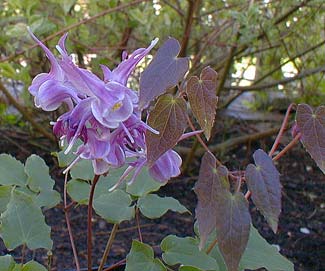 'Lilafee' or 'Lilac Fairy' Barrenwort,
'Lilafee' or 'Lilac Fairy' Barrenwort,
or Longspur Epimedium
"Golden moths on snapdragons,
Dusk settling on tall blue junipers
And fireflies colliding with fairy wings
While the lanterns glow."
- Irene McIsaac,
2003
2003
'Lilafee' Barrenwort, Fairy Wings, of Bishop's Cap is a cultivar of Epimedium grandiflorum. In April & May it has lilac-purple flowers which look like spider-legged tadpoles with yellow throats, swimming over small leaves.
The leaves emerge slender, heart-shaped in green & maroon-brown. By the time the flowers are finished, the leaves have become quite large with the broader bishop's hat shape, in darker olive green with or without reddish webbing. These leaves change quite a bit through the year, & gain a red coppery sheen in autumn.
Most epimediums are grown for the gorgeous leaves more than for the flowers, but some of them have quite extraordinary flowers as well, & 'Lilafee' is one such, having larger blooms with a very impactful color. The regular species has white rather than lilac blooms, also of larger than average size.
The species has several natural color variants & subspecies that have made it particularly valuable in hybridization programs for some of the finest gardened epimediums in the nursery trade.
It will thrive in shade or sunlight in moist well-drained soil, & is particularly pleasant underneath shrubs. It's usually only about ten inches tall, but over time may hump up to a taller clump. Old clumps become surprisingly drought tolerant. It spreads slowly by rhizomes, but in three or four years will have a considerable spread, & can be divided in autumn if a gardener wants some starts to put elsewhere or give away.
Some epimediums are deciduous but this one is evergreen. It'll look scruffy by winter's end & at some point will need to be trimmed back, preferably before new growth begins. Hardy for zones five through eight, it will not prove its evergreen capacity at the colder edge of its range, but will otherwise be just as pleasing.
The species grows wild over a very broad range from the Mediterranean through Central Asia & into China. In China & Japan it is widely regarded as a magic cure for most male & some female complaints, including liver dysfunction (brought about by alcoholism), all effects of old age, & in particular, impotence. Chinese guys sure must worry about their peckers a lot, as every con artist with a mortar & pestle has a thousand things pretending to fix up that itsy-bitsy problem.
Never let it be said westerners don't recognize a good scam when they see one. By the whimsical name Horny Goat Weed, it is sold to the fantastically gullible as an Alternative Medicine, in the degraded forms of powder, pill, or gelatin capsules, alleging all sorts of diseases & conditions for which it has no proven effect whatsoever, but especially as an Herbal Viagra. It's even available as a spray so that one might spritz the malfunctioning member! The silly epithet is derived from its Chinese name, Yin Yang Huo, the "licentuous goat herb."
A few studies in Asia have indicated there are indeed potential medicinal values for pharmaceutical grade extracts of various epimediums (as opposed to the ground up garden rubble sold to impotent rubes). The precise merits indicated in the science do not match up to the values alleged by purveyors of aphrodisiacs. In the paraphrases of hoodwinking quacks, an authentic study is which may have indicated a faint possibility of marginal relief of prostitis in old men is inferred to have provided proof that Horny Goat Weed turns geezers into young studs. I wonder, if it were sold under that other name Fairy Wings, would these rubes have to assume the magic only assists gay geezers?
Due to the sorry fact that some people do "believe" in this herb for the purposes it is sold for, I must append this unambiguous citation: Consumer Lab Dot Com promotes independent testing of herbal remedies, assesses extant data, & with a completely open mind untainted by sales pitches, reveal which herbs definitely or possibly have useful medicinal values, & which definitely or probably do not. In the case of epimedium, they found first of all that no Horny Goat Weed product on the market had ever been tested for efficacy or safety. Further, of the extant independent research of pharmaceutical grade epimedium (such studies as herbal promoters love to allude to pretending it applies to their ground up garden rubble), not one of the published trials gives the least indication of epimedium's efficacy as a sexual enhancer. Not even one. Alas & alack, I somehow doubt reality will harm its sales.
Despite all that, as a garden plant, it is first rate & lovely.